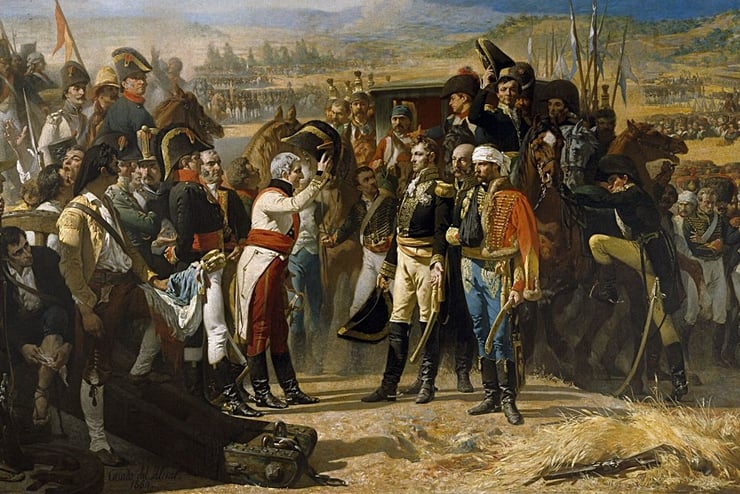If the American right feels pinned down by an enfilade coming from the institutions it has traditionally identified with and defended, that’s because that is precisely what is happening. Pressed up against the berm, the only way out for the right is through a place it has avoided.
With the fall of academia, the ideological homogenization of the media and popular culture, and the left turn within most institutions of government, the military and law enforcement branches have been perceived as civilizational backstops by the right, which provide order and authority in a sea of chaos. But this illusion is evaporating, exposing these force-wielding branches as the maw of the managerial regime.
Law-abiding Americans are now subject to both the anarchy of the mob and the tyranny of law enforcement turned primarily against decent citizens—what Samuel T. Francis called in these pages a “Hegelian synthesis” of seemingly dialectical opposites. It is, according to Francis, the “combination of oppressive government power against the innocent and the law-abiding and, simultaneously, a grotesque paralysis of the ability or the will to use that power to carry out basic public duties such as protection or public safety.”
Law enforcement across the country has indeed retreated from policing violent crime for fear of triggering media outrage and Black Lives Matter riots—also known as the “Ferguson Effect,” after the 2014 officer-involved shooting of Michael Brown in Ferguson, Missouri. Preliminary FBI data for 2020 shows a 25 percent increase in murders—the largest single-year increase since the agency began publishing the data in 1960. St. Louis reached a homicide rate of 87 per 100,000 residents—a 50-year high and more than three times greater than that of Mexico. This fact was noted by former Baltimore Police Commissioner Jason Johnson in USA Today. He blamed “de-policing” on anti-police sentiment.
“De-policing” isn’t exactly what’s happening, however. As riots swept the country last year, FBI agents, police officers, and National Guardsmen kneeled with Black Lives Matter agitators. “I’m black and I’m proud” one D.C. National Guardsman chanted in front of cameras. Army Secretary Ryan McCarthy assured reporters that the military would look the other way in these incidents. “We don’t want to punish our soldiers,” he said. “We’re going to listen to each other, and we want to just make sure everybody understands, we don’t want to protest in uniform.”
As far as the federal government is concerned, there is no real enemy on the left. This is because so much of the left’s agenda dovetails with the interests of the regime, from the business of empire under the guise of humanitarianism to the expansion of the surveillance apparatus. Indeed, a surveillance effort by the U.S. Postal Service was recently revealed to the public, wherein analysts scour social media sites searching for “inflammatory” postings, which are then shared across government agencies. A document viewed by Yahoo! News mentions, of course, the monitoring of “right-wing leaning Parler and Telegram accounts.”
Law enforcement agencies and the military function as enforcement arms of the managerial regime. This is not to say there are no good individuals in these organizations but that, as institutions, they are not immune from the same rot afflicting virtually every other organization. Increasingly they serve to intimidate, surveil, and punish those who defend themselves from violent criminals—especially violent black criminals—and those who violate the arbitrary and apparently permanent COVID-19 mandates—which have less to do with public health than the power of modern, enlightened absolutism. The position of our right is akin to that of the Spanish guerrilleros who stood against Napoleon’s “enlightened” politico-military order in the early 19th century.
The Spanish partisan war against Napoleon’s forces began after the French routed the Spanish regular army and occupied the country. Some 50,000 pious, “backward” Spanish peasants blocked the advance of approximately 255,000 French regular troops carrying with them the ideas of 1789. “The salient point of the Spanish partisan’s situation in 1808,” wrote Carl Schmitt, “was that he took the risk of fighting on his home soil, while his own king and the royal family hadn’t yet decided who the real enemy was.”
The Spanish nobility, high clergy, and bourgeoisie—its ruling class, in other words—were largely sympathetic to their foreign conquerors. The partisan war, Schmitt explained, concerned the political structure—in the case of the guerrilleros, against the public sphere established by Napoleon—in contrast to conventional wars of the day between sovereigns, which were not aimed at fundamentally changing the political order.
Our political order in the United States seeks no peace agreement with America’s partisans on the right. Therefore, the right must take up new, nonviolent campaigns, such as a reinvigorated effort to cut the Pentagon’s budget and to defund surveillance agencies. It must also target the endowments of universities, where many ideas antagonistic to the right originate, and embrace punitive measures against corporations that cooperate with or promote surveillance or censorship.
Partisan war, as Lenin said and as Schmitt concurred, is “an inevitable form of struggle,” which must be, and can only be, fought by disabusing oneself of preconceived principles and illusions.
Image Credit:
above: detail from The Surrender of Bailén , by José Casado del Alisal, oil on canvas, 1864. The Battle of Bailén was fought on July 19, 1808 and marked the first defeat of the Napoleonic armies at the hands of the Spanish. ( Public domain/Wikimedia Commons)

Leave a Reply